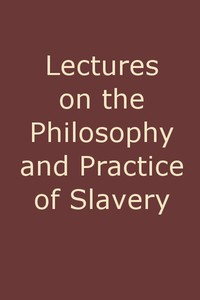Lectures on the Philosophy and Practice of Slavery by William A. Smith
"Lectures on the Philosophy and Practice of Slavery" by William A. Smith is a collection of lectures written in the mid-19th century that addresses the controversial subject of domestic slavery in the United States. The work presents a philosophical defense of slavery, arguing for its moral justification based on social principles and the condition of the African race in America. The author, who is a president of a college, aims to clarify
the moral and philosophical underpinnings of slavery against popular abolitionist arguments. The opening of the text sets the stage for a thorough examination of the institution of domestic slavery, questioning whether it is sinful in principle. Smith acknowledges the discomfort surrounding discussions of slavery among Southern people, yet emphasizes the necessity of honest inquiry into its moral implications. He argues that theories suggesting slavery is inherently wrong overlook the historical and social context of the African population, positing that the principle of control by one individual over another is a fundamental aspect of all forms of governance. Smith aims to establish the idea that slavery, as an institution, can be justified and is steeped in a moral obligation towards the well-being of enslaved individuals, highlighting a complex interplay of ethics, governance, and social duty. (This is an automatically generated summary.)
Read or download for free
| How to read | Url | Size | |||
|---|---|---|---|---|---|
| Read now! | https://www.gutenberg.org/ebooks/41019.html.images | 502 kB | |||
| EPUB3 (E-readers incl. Send-to-Kindle) | https://www.gutenberg.org/ebooks/41019.epub3.images | 337 kB | |||
| EPUB (older E-readers) | https://www.gutenberg.org/ebooks/41019.epub.images | 340 kB | |||
| EPUB (no images, older E-readers) | https://www.gutenberg.org/ebooks/41019.epub.noimages | 215 kB | |||
| Kindle | https://www.gutenberg.org/ebooks/41019.kf8.images | 480 kB | |||
| older Kindles | https://www.gutenberg.org/ebooks/41019.kindle.images | 430 kB | |||
| Plain Text UTF-8 | https://www.gutenberg.org/ebooks/41019.txt.utf-8 | 459 kB | |||
| Download HTML (zip) | https://www.gutenberg.org/cache/epub/41019/pg41019-h.zip | 295 kB | |||
| There may be more files related to this item. | |||||
Similar Books
About this eBook
| Author | Smith, William A. (William Andrew), 1802-1870 |
|---|---|
| Editor | Summers, Thomas O. (Thomas Osmond), 1812-1882 |
| Title |
Lectures on the Philosophy and Practice of Slavery As Exhibited in the Institution of Domestic Slavery in the United States, with the Duties of Masters to Slaves |
| Credits |
Produced by Jonathan Ingram, Matthew Wheaton and the Online Distributed Proofreading Team at http://www.pgdp.net (This file was produced from images generously made available by The Internet Archive) |
| Reading Level | Reading ease score: 54.9 (10th to 12th grade). Somewhat difficult to read. |
| Language | English |
| LoC Class | E300: History: America: Revolution to the Civil War (1783-1861) |
| Subject | Slavery -- United States |
| Category | Text |
| EBook-No. | 41019 |
| Release Date | Oct 11, 2012 |
| Copyright Status | Public domain in the USA. |
| Downloads | 213 downloads in the last 30 days. |
| Project Gutenberg eBooks are always free! | |

